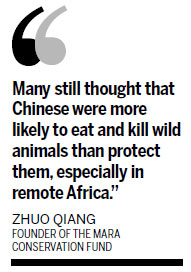 |
|
Lai Dequan (right), a Chinese artist, checks an orphaned leopard in Nairobi, Kenya, in May 2013. [Photo/Xinhua] |
Zhuo Qiang established the Mara Conservation Fund to protect lions and other wild animals in Maasai Mara, enjoying the sense of fulfillment from helping the big cats in the Kenyan reserve's savannah.
But Zhuo, the only person from China with a mission of this kind in Africa, admits he was overwhelmed by a sense of loneliness.
"Distrust, doubt and scrutiny were initially some of the most common reactions to my efforts," he said. "Many still thought that Chinese were more likely to eat and kill wild animals than protect them, especially in remote Africa," he said.
"It was true that we were not prominent enough in this respect, so we could only prove ourselves by consistent action and commitment," Zhuo said.
But now he has received a shot of inspiration - from Premier Li Keqiang's visit to Africa.
The trip marks the first time a top Chinese leader has pledged to focus more on ecological systems, wildlife protection and collaboration with African countries in these fields, which shows the Chinese government's growing global responsibility.
Li visited the Ivory Burning Site Monument in Nairobi National Park with Kenyan President Uhuru Kenyatta on Saturday during his visit to the country.
He said he wanted to send a loud and clear message, in the presence of Kenyatta and dozens of reporters, that the Chinese government is firmly resolved to protect wildlife and resources and will continue to share Kenya's commitment to fight the illegal ivory trade.
While encouraging more Chinese to come to Kenya and enjoy the beautiful landscape, Li said he will also increase efforts to cooperate with Kenya to fight illegal ivory trading and protect wildlife and resources.
"It is true that we have seen an increase in cases of illegal hunting and trade of ivory and other products," Li said. "But the Chinese government has taken and will continue to take legal steps to seriously deal with these cases."
Earlier this year, China established an interagency effort to fight illegal ivory trading, and it has also, for the first time, destroyed 61,000 metric tons of illegally traded ivory.
"Africa is the last Garden of Eden, and its rain forests, wetlands and savannahs are vital to the global ecological system," Zhuo said. "If the ecology and environment are damaged, then all other parts of the world including China would be severely affected, so there is a compelling obligation for China to join this effort."
Zhuo added that ivory and rhino horn smuggling involving Chinese has hurt the image of the Chinese community in Africa, so wildlife and conservation must be given the same priority as such fields as infrastructure and trade.
"We are so inspired by the messages given by Premier Li and we have to clearly speak out that the Chinese are coming, not to destroy the environment, but to join global efforts to protect the last paradise," he said.
Iain Douglas-Hamilton, a conservation scientist and founder of Save the Elephants, said China has its own well-developed experience in protecting wild animals, especially elephants in China, and this experience should be shared with others.

"Chinese and African affairs are increasingly intertwined. The Chinese government's $10 million contribution to Africa's wildlife and environment is a crucial investment in the future of one of the world's natural wonders," he said. "These funds are urgently needed to protect elephants from poachers in Kenya, but China holds the key to a much bigger prize. By ending domestic sales in ivory, China could ensure the survival of elephants across the African continent."
According to Michael Gachanja, executive director of the East African Wild Life Society, China's commitment could greatly help the region combat increasing poaching to avoid extinction of species.
"Especially the two sides could work together to improve the law enforcement and implementation to foil the illegal activities," he added.
Li also met with representatives from United Nations agencies, including the United Nations Environment Programme and UN-Habitat, to discuss future collaboration in protecting the global environment and ecological diversity.
In a meeting with Achim Steiner, executive director of UNEP, Li said China "would like to continue to collaborate with UNEP to enhance green development and sustainable environmental management."
Additionally, Li said, "China has contributed $6 million to the UNEP trust fund and will continue to make contributions to that fund in the future. China also wants to enhance communication, cooperation and coordination with UNEP and multilateral environmental agreements."
Stainer said a new agreement signed between the two sides to harness their strengths, capacities and resources to help countries of the Global South combat climate change "sends another powerful message that China is committed to combating climate change, not only within its own borders, but across the Global South".
Contact the writers at zhaoyinan@chinadaily.com.cn and lilianxing@chinadaily.com.cn.
